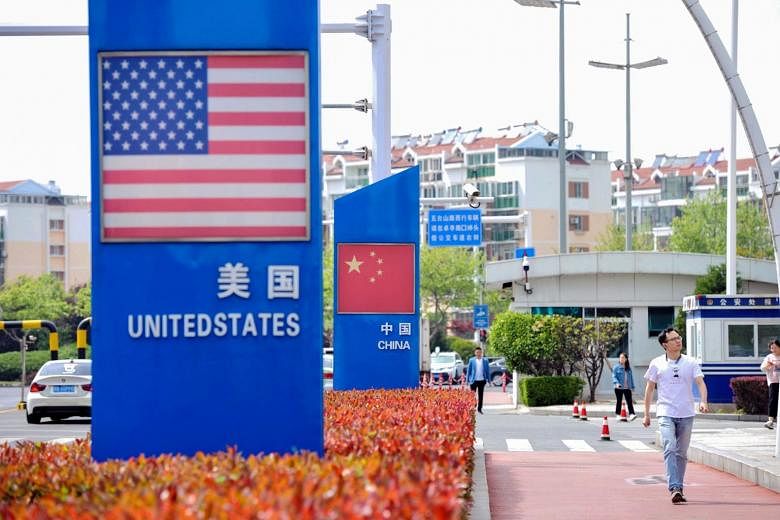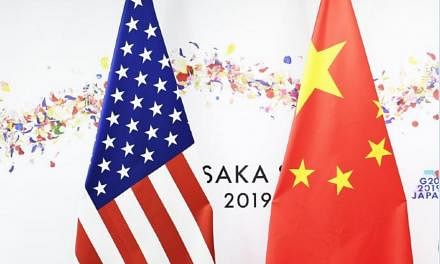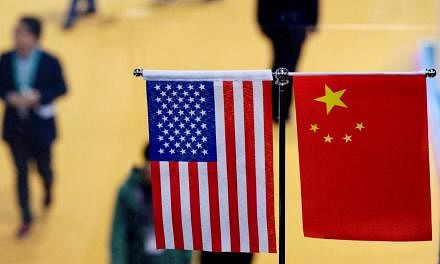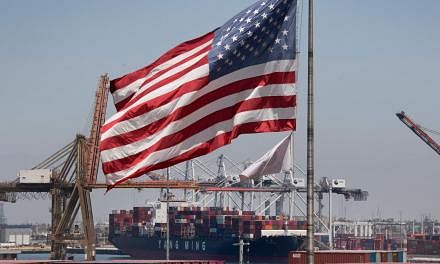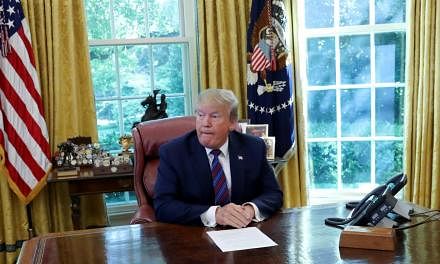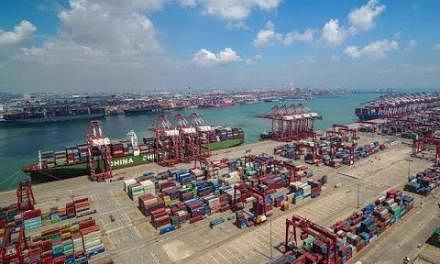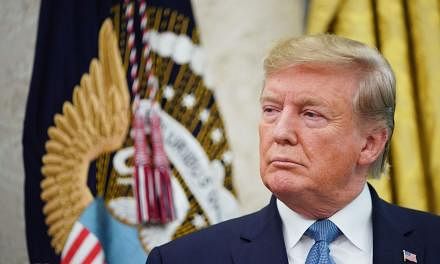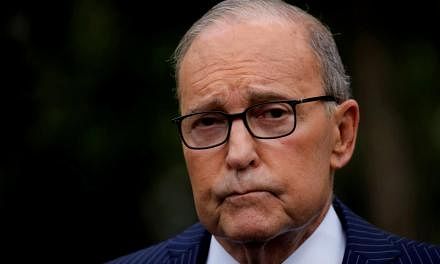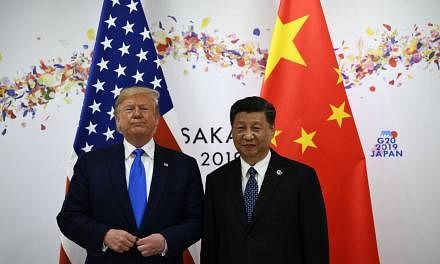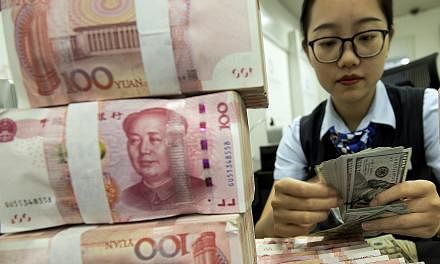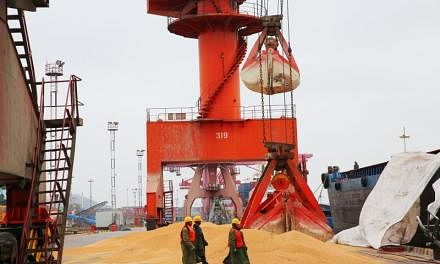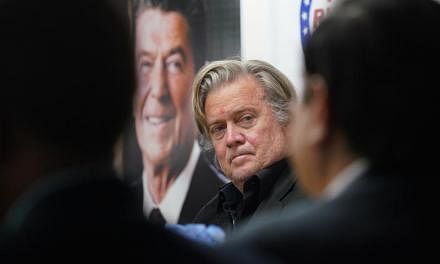WASHINGTON - The United States and China both moved closer to escalating trade tensions, with Washington filing a formal notice on Wednesday (May 8) that it would raise tariffs on Chinese goods on Friday and Beijing declaring it would respond in kind.
Their hardline stances make it increasingly unlikely that this week's trade talks will break the impasse and de-escalate tariffs.
They also underscore just how far apart Washington and Beijing are on their deep-seated trade differences, despite recent optimism that trade negotiations were in the endgame stage.
Behind many key sticking points are years of entrenched economic policies and very different priorities of the American and Chinese economies and companies, said experts.
America's demands, built on years of frustration with Chinese practices that disadvantage foreign companies, may now be asking China to do too much too quickly.
But even if the trade deal is sealed, experts do not foresee a quick change in behaviour from Beijing.
Said Wilson Centre senior associate for North-east Asia Shihoko Goto: "China's economic success has been based on violating many of the World Trade Organisation's rules, and it is unlikely to change that model of growth willingly.
"Whatever the outcome of the latest US-China negotiations, that struggle to have Beijing adhere to the international trade rules that China had signed up for will continue to persist. This will be an ongoing source of contention," she added.
Enforcement
The US wants the right to re-impose tariffs unilaterally on China, without retaliation, if it does not comply with the deal. Beijing however sees this as a public undermining of its sovereignty .
Eurasia Group China analyst Andrew Coflan told The Straits Times that the enforcement mechanism is a key differentiating factor between President Donald Trump's negotiations and previous rounds of agreements.
"The Trump administration has, rightly, criticised past administrations for making agreements with China, only to have no recourse when China fails to follow either the letter or the spirit of the agreement. The ability to tie punishment to compliance failures is the key element that Trump would be able to point to as a successful improvement to US-China relations from the US side," said Mr Coflan.
But China sees this as echoing the unequal treaties it had been forced into in the past, when foreign governments used their military might to compel China to open up foreign ports in the 1800s, he said.
Enforcement mechanisms also run counter to Chinese President Xi Jinping's image of a new China that is powerful and equal with the US.
Added Mr Coflan: "If the US can unilaterally impose tariffs, then that makes China the clear loser in this deal, and Xi a loser as well. That's as hard to stomach as the historical parallels."
Hinrich Foundation research fellow Stephen Olson said that America's firm stance on enforcement shows its lack of trust in China.
Mr Olson, a former US trade negotiator, said: "The erosion of trust which has been endemic throughout the global trade system is almost certainly influencing the US' strong insistence on a robust enforcement mechanism. In the opinion of the US, there have simply been too many occasions in which China has failed to fully live up to its trade commitments."
Another impasse is over how China will implement the agreement. The US wants the trade pact to include a list of laws that Beijing must change to comply with the agreement, the Wall Street Journal reported this week.
America sees the list as essential to ensuring that China carries out the structural change it has promised, but China objects to its inclusion.
Mr Coflan said: "The US wants these changes codified into law, not simply done through regulations and administrative measures."
But China's political processes pose some obstacles because its law-making body, the National People's Congress, meets and passes laws only once a year, in March.
"Action through China's executive body - the State Council - would be quicker, but have less force and concreteness than a legislative change, he added.
Tariff removal
American trade officials are keen to retain tariffs on Chinese goods some time after the deal is signed to enforce the agreement, but the Chinese want them lifted quickly. Escalating matters, the US has vowed to move forward with a previously postponed tariff hike from 10 per cent to 25 per cent on Friday.
One way forward, said Mr Coflan, is for the US to unwind this latest hike as a first step. Once a deal is signed, American tariffs on a portion of the US$200 billion (S$272 billion) of Chinese goods being taxed can be removed, possibly on specific industries of Beijing's choosing.
The US could keep its original round of tariffs on a separate US$50 billion of Chinese goods in place, while pushing for a wind-down of Chinese tariffs, he added.
McLarty Associates senior adviser Steven Okun noted the tariffs had been imposed based on an investigation of Chinese intellectual property practices.
"For the US to have any credibility in taking down the existing tariffs, China must structurally address ending forced technology transfers, increasing IP protection, removing non-tariff barriers and stopping cyber intrusions and theft," he said.
"China cannot be seen as undertaking these changes subject to pressure from the US. However, that is the position which China now faces. Until both sides find a way to declare they are acting in its own self-interest, the ongoing trade war will persist," he said.
State subsidies
At the heart of America's grievances against China is that its economic policy, particularly state subsidies to targeted sectors, creates unfair advantages for domestic companies, including exporters, while discriminating against foreign companies.
But curbing state subsidies to domestic companies to level the playing field for foreign firms runs up against vested Chinese interests, said analysts.
State support also underpins Made in China 2025, the country's national drive to gain global preeminence in earmarked industries.
Moreover, there are many kinds of subsidies from the national to the provincial level, and differences in what the US and China consider a subsidy.
Said Mr Olson: "Subsidies are at the heart of China's industrial policies and its state-led capitalism model. Eliminating or even just curtailing these subsidies could undermine China's ability to achieve its economic development objectives.
"Although China will likely be willing to make some progress on this issue, it is unlikely to agree to anything that would substantially limit its ability to pursue industrial policy," he added.
Forced tech transfers
The US also wants China to end trade secret theft and requirements that foreign companies must hand over their technology to operate in the Chinese market.
The Chinese passed a foreign investment law in March that bans forced technology transfer and punishes government officials who steal trade secrets, in an apparent move to placate the US. But America is sceptical that the law will be enforced.
Digital trade
China is also reluctant to liberalise digital trade, one of the items the US is pushing for on behalf of American technology companies. Among the restrictions the US is targeting are requirements that companies must store data locally, and limits to the transfer of data overseas.
The push for digital trade is a high-profile example of the differences in reciprocity between both countries, said Mr Coflan.
He cited how China's Alibaba was able to set up a cloud company in the US while undertaking only the normal business registration procedures, while America's Apple was forced to partner a Chinese company to host iCloud services in China.
From America's perspective, forcing US companies to rely on Chinese cloud providers and store their data in China could expose their trade secrets and citizens' information to Chinese authorities.
"By restricting access to foreign firms in China, Beijing unfairly provides domestic firms with an enormous customer base of both businesses and consumers, and locks out foreign firms from a huge market," he said.
"China, for its part, wants to nurture its tech champions and ensure what it sees as its digital sovereignty," he said, adding that China's concerns include that foreign firms would use their cloud services to somehow support activities that are damaging to the Communist Party or Chinese state.
To allow cloud firms in, China would also have to liberalise numerous elements of its regulatory regime, eliminating non-tariff barriers to operation and competition that have long privileged domestic players, said Mr Coflan.
"At a basic level, this feels like China is acquiescing to too many demands that force too much action, always an uncomfortable feeling, especially for a regime like China's," he added.
